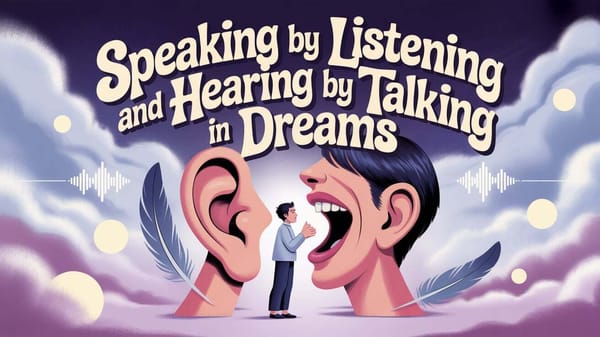Losing Your Voice or Inability to Speak in a Dream

There's something deeply unsettling when you find yourself in a scenario where you're striving to articulate, but the words are trapped inside—manifested as a silent scream in a dream, a relentless struggle against an invisible shroud muffling your voice. It's a dream theme that etches itself on your subconscious canvas time and again; the eerie sensation of finding your voice lost, or worse, stolen. Such dreams unleash a flurry of questions: Why am I mute? Who or what is constraining my voice? What does all this mean? Now, let's soar into the mystifying landscape of dreams, deciphering the enigma of silence.
The Symbolic and Spiritual Significance of Losing Your Voice or Inability to Speak
Drilling deeper into the underbelly of dreams, your voice is not just a mere echo in the wind. It is your identity, your resonance, your tool for expression. When you encounter scenarios where you lose this powerful executor of your thoughts and emotions, it often unfurls layers of symbolic and spiritual connotations.
At its core, this dream scenario often dovetails with a feeling of loss of control and power, hinting at an inner battle to express yourself or your stand in a matter. Being voiceless or speechless in a dream could be a potent symbol of feeling marginalized or helpless, signaling towards your waking life's stifled cries and whispers.

This dream theme stretches its tendrils into spirituality as well, establishing it as a call for voicing your truth, a rebellion against suppression—a message from the Universe, urging you to stand for your beliefs and break the chains of suppression or denial that vaguely echo in your waking life.
What Do Different "Inability to Speak" Scenarios Mean?
In the theater of dreams, minute details may have overarching implications, providing a breeding ground for multiple scenarios and interpretations. You could be voiceless amidst a crowd, or maybe your voice shrinks into an inaudible whisper every time you try to express something vital. All these are different strokes on the vast canvas of dreams and hold their unique semantics.
If you dream of becoming mute in a sea of faces, it could be a mirror reflecting your anxieties centered around public speaking or perhaps a perceived 'invisibility' among friends, family, or colleagues. It might also be hinting at your struggle to assert your opinion effectively in groups.

In contrast, if your voice fades away while trying to warn or save someone, it may bear seeds of your fears and doubts about your credibility—would people listen to your advice? Would they consider your inputs valuable or shrug them off?
Physically being unable to speak due to a constraint such as a clamped mouth or bound throat, could symbolize feeling restrained, trapped, the emotions bottled up within you, chewing at your peace.
Psychological Interpretations of Losing Your Voice or Inability to Speak
Losing your voice or being unable to speak sketches intriguing psychological implications. When viewed through Freudian lens, it may point towards emotions or information that you're holding back, an intention unwilling to travel from your brain to your lips. They could be desires, feelings, or thoughts, suppressed to avoid conflict or maintain harmony in your conscious, waking life.

Jungian perspective might churn different insights altogether. Carl Jung might interpret such a situation as a dance between the conscious and the shadow self—the parts of your personality that you often push into the darkest corners of your mind, refusing to acknowledge them in the open.
For energy-based healing practices like Reiki, such a dream might beam a red flag indicating a blocked throat chakra, the energy center governing communication and self-expression.
Common Causes and Factors Behind The Inability to Speak in Dreams
Dreams often wax and wane over the ebbing tide of our daily lives. As such, a dream where you're unable to voice your thoughts often signals unvoiced anxieties, feelings of overwhelm, or situations in your waking life where your opinion feels crushed or ignored.
Often people who feel unheard, misunderstood, or are grappling with stressful scenarios or heavy emotional turbulence, are the ones that tread the path of such dreams. The inability to speak primarily signifies an intrinsic struggle against an emotion, situation, or desire that you're trying to "keep off your chest."
Scientific Explanifications for Losing Your Voice or Inability to Speak in Dreams
From a neurological point of view, such dreams may revolve around anxiety or high-stress levels affecting your brain's communication during sleep, leading to the manifestation of similar dream content. Also, during REM (Rapid Eye Movement) sleep, our conscious self takes a back seat, and the subconscious impulses often hijack the stage. As such, these stages facilitate processing of emotional memories and can intensify dream narratives related to your daily worries or concerns.
Coping Strategies for Dreams of Losing Your Voice or Inability To Speak
Dream interpretations, though intriguing, are only half the journey. The rest lies in mapping these interpretations into viable coping strategies. To do this, one of the first, and perhaps stringent coping strategies, is acknowledgment—addressing the fact that there could be pent-up feelings or issues that you need to parse through. A dream journal comes of great aid here; it's a record of the labyrinth of images, emotions, and stimuli present in your nightly ventures—a roadmap to understanding recurring patterns in your dream.
It is equally crucial to ensure a rejuvenating sleep, focus on stress management, and seek ways to express oneself in a healthy and assertive manner. Should these dreams cloud your peace or recur frequently, stepping towards professional aid is the way forward.
Summary & Final Thoughts
While dreams of losing your voice or inability to speak may be puzzling, they symbolize suppressed emotions, anxiety, and a need for better self-expression. They are a whisk in your subconscious concoction, blending in your fears, worries, and yearnings, painting a disguised yet significant picture. Therefore, view these dreams as stepping stones towards self-awareness that can nudge you into becoming a better, assertive version of yourself.
Frequently Asked Questions
1. Is it common to lose your voice or be unable to speak in a dream?
Yes, dreams about losing your voice or inability to speak are pretty common among individuals of all ages and cultures.
2. Does such a dream indicate a physical problem?
Though dreams reflect on our physical as well as emotional state, more often than not, dreams about losing your voice or being unable to speak translate into symbolic meanings revolving around communication and self-expression rather than pointing towards a concrete physical ailment.
3. How can you stop yourself from losing your voice in a dream?
While there's no surefire trick to control your dreams, addressing waking-life stressors, expressing suppressed thoughts/desires, and following good sleep routines may help alleviate distressing dreams.
4. Does losing your voice in a dream mean you won't be heard in real life?
Though the dream could be construed as a metaphor for not being heard, it doesn't literally indicate that you won't be heard in your waking life. It's often a reflection of your feelings or apprehensions rather than a prediction.
5. Could these dreams indicate a mental health issue?
While recurring, distressing dreams could be linked with increased anxiety or stress, they don't directly diagnose a mental health issue. However, if such dreams occur persistently and cause significant distress, consulting with a mental health professional is recommended.




